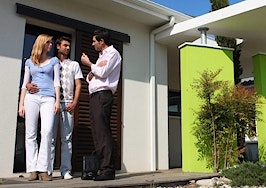- Serving wine or cocktails with some appetizers creates a nice atmosphere for a high-end open house. But what are your risks as an agent or broker?
- Many agents suggest careful planning and controls, such as using a third-party vendor and imposing a drink limit.
- Other agents said the payoff wouldn't be worth it after considering liability issues, local laws and brokerage guidelines.
Long gone are the days of sticking a sign in the lawn with a few balloons to draw in potential homebuyers to an open house. Agents are stepping their game up and making home tours into swanky events complete with lavish decor, catered food and a great playlist. But is it going too far to offer wine or other drinks at open houses?
[Tweet “Is it going to far to offer wine or other drinks at open houses?”]
That’s the question Mechelle Reasoner posed to her fellow agents on the Agent War Room and Raise the Bar in Real Estate Facebook group pages. She wrote:
I am doing a twilight open house for an upscale home with great views. I will probably be doing light finger foods. Has anyone served wine during an open house? I have mixed emotions about it, but the client asked if I would be. I worry about liability.
Agents who agreed with Reasoner serving wine at her open house said she could do so, but only with impeccable planning and under highly supervised circumstances.
“In our area, it’s pretty common at Broker Opens to serve drinks, but not at an open house for the public,” says Cassie Barras Rodenbaugh, a Realtor with Re/Max. “Some of the higher-end houses do invitation-only cocktail parties to help promote the house while on the market. That way you can control who comes and there’s more of an atmosphere to it than at a regular open house.”
[Tweet “If you want to serve drinks, make your open house invite-only.”]
Jesus Almaraz offered up another option — Reasoner could leave the open house open to the public while maintaining control over who can drink and establishing a safe two-drink limit.
“What about doing tickets with registration,” asks Almaraz. “Register with your name, email, phone number and get two drink tickets. [That way] you capture the prospect’s information for follow-up and agent’s name for marketing and feedback.”
[Tweet “Ask guests to register their name and give them two drink tickets to use at the bar.”]
Although Rodenbaugh and Almaraz’s provided some viable and well-received options for controlling guests and how much they drink, some agents were still concerned about who would be liable if one or a group of guests couldn’t be tamed.
Dennis Butler and Anne Meczywor suggested hiring licensed bartenders or a winery to serve drinks, so the liability would be on them instead of the agent and homeowner.
[Tweet “Use a third party vendor so they can absorb the liability.”]
“If you have a local winery, they might do a wine tasting, therefore assuming all liability,” says Butler.
Dram shop and social host laws
In most states, business and individuals alike can be held liable for damages related to serving minors. However, even if you ensure everyone at your event is over the age of 21, or implement a wristband system of sorts, you still may face liability concerns for all guests as an open house host when drinks are involved.
Before you go on a booze run, first research your state and local dram shop and social host liability laws.
[Tweet “Before you go on a booze run, first research your state and local laws.”]
Named after 18th-century establishments that served gin by the spoonful or “dram,” dram shop statutes apply to nearly all states by varying degree. These laws delineate the basis by which businesses may be held liable for damages caused by the sale and consumption of alcohol. Many dram shop actions have revised stricter liability legislation to stipulate that bars and restaurants won’t be held liable unless there’s proof alcohol was served to an “obviously” or “habitually intoxicated” person (or a minor).
Open house hosts, who aren’t typically acting in the capacity of a commercial establishment or licensed to sell alcoholic beverages, would not be considered liable under state dram shop law. But falling within the dram shop legal family are social host liability laws that, again, differ by state. Social hosts are defined as those who by implication or express invitation invite another person to their home as a guest.
[Tweet “Dram shop laws are named after 18th-century bars that served gin by the spoonful.”]
FindLaw.com lists the following states as having social host liability laws that extend to guests of all ages:
- Alaska
- Arkansas
- Connecticut
- Hawaii
- Maine
- Maryland
- Massachusetts
- Missouri
- New Jersey
- Ohio
- Oklahoma
- Oregon
- Pennsylvania
- Rhode Island
- South Carolina
- Tennessee
- Washington
- Wisconsin
Social host liabilities were designed to be less strict than dram shop statutes (commercial restaurants, bars), and a number of factors make them limited in scope. For one, it’s difficult to prove proximate cause — that is, the serving of alcohol caused the damages in question — and the threshold for “visibly” intoxicated is also slippery.
But better to know all the details of a situation before you make plans.
The bottom line is that in some states, it’s possible that the victim of an alcohol-related car crash caused by a guest (who is over 21) could recover damages from a social host. Some standard of negligence would most likely need to be shown. Minors remain the biggest concern and risk of liability.
That’s why hiring a catering or bar service can be an effective safeguard — the employees are likely trained to check for fake IDs and the business should be covered by insurance.
You can look up the specific legal information on dram shop and social host liability laws for your state (and the relevant case law) here.
[Tweet “Hiring a catering or bar service can be an effective safeguard.”]
So you know your state laws — now what?
On Facebook, Swanepoel T3 Group’s Leslie Ebersole wrote that even if your local laws says it’s legal for you to serve drinks, you should consider the standards set by your brokerage and local board.
“[Serving drinks is] strongly discouraged by my brokerage and the local board. Why risk it?” says Ebersole.
An article by the National Association of Realtors suggested finding out if your brokerage’s insurance includes liability coverage. In most cases, it won’t.
Brandon Kekich agreed with Ebersole and said that asking your broker first is the “best advice” for any agent considering making their open house into a cocktail event.
“You probably have some local ordinances, permits and insurance requirements regarding the offering of alcohol. It’s a big can of worms.”
[Tweet “Ask your brokerage before serving drinks at an open house.”]
“If you do something that violates your office policy — whether serving alcohol or using a non-standard addendum — the insurance policies won’t cover you if something goes bad,” says Kekich.
Overall, agents seem to think that serving drinks is a bigger headache that it’s worth, and a few noted that alcohol isn’t a requirement for fun.
Susana Maria suggested that Reasoner serve non-alcoholic party drinks, such as Shirley Temples, and other agents said sparkling grape juice or apple cider add just as much class to an event as champagne.
That said, if you’d like to serve alcohol, some basic rules of thumb are:
- Limit serving time
- Limit the number of drinks per guest
- Maintain the right to deny service
- Don’t serve anyone who is “visibly” intoxicated
- Offer alternative transportation (Uber, cabs, etc.)
What do you think? Should agents serve drinks at open houses?
Caroline Feeney contributed reporting to this story.





